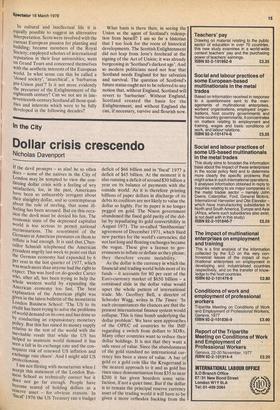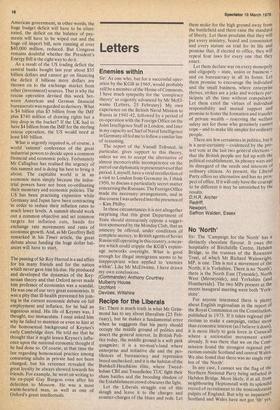In the City
Dollar crisis crescendo
Nicholas Davenport
If the devil prompts — as alas! he so often does — some of the natives in the City of London may be tempted to view the continuing dollar crisis with a feeling of wry satisfaction, for, in the past, Americans have been so unbearably arrogant about their almighty dollar, and so contemptuous about the role of sterling, that some illfeeling has been aroused. But on this Si the devil must be denied his fun. The economic state of the depressed capitalist world is too serious to permit national recriminations. The resentment of the Germans at American pressures on them to reflate is bad enough. It is said that Chancellor Schmidt telephoned the American President angrily last week to point out that the German economy had expanded by 6 Per cent in the last quarter of 1977, which Was much more than anyone had the right to expect. This was hard on do-gooder Carter who, after all, has been trying to help the Whole western world by expanding the American economy too fast. The best explanation of the American plight was given in the latest bulletin of the monetarist London Business School: `The US to its credit has been trying to solve the problems of world demand on its own and has done so by conducting an expansionary monetary Policy. But this has raised its money supply relative to the rest of the world with the inevitable result that while the US has helped to maintain world demand it has seen a fall in its exchange rate and the consequent risk of renewed US inflation and exchange rate chaos'. And I might add US protectionism.
I am not flirting with monetarism when accept this statement of the London Business School as technically correct but it does not go far enough. People have become scared of holding dollars as a t:eserve asset — for obvious reasons. In fiscal' 1976 the US Treasury ran a budget
deficit of $66 billion and in `fiscal' 1977 a deficit of $45 billion. At the moment it is also running a deficit of around $30 billion a year on its balance of payments with the outside world. As it is therefore printing billions of paper dollars in discharge of its debts its creditors are not likely to value the dollar so highly. For its paper is no longer pegged on gold. The Nixon government abandoned the fixed gold parity of the dollar by repudiating its gold convertibility in August 1971. The so-called `Smithsonian' agreement of December 1971, which fixed new parities for the world's currencies, did not last long and floating exchanges became the vogue. These give a licence to governments to inflate or deflate as they please; they therefore create instability.
As the dollar is the currency in which the financial and trading world holds most of its funds — it accounts for 80 per cent of the Euro-currency market of $650 billion — a continued slide in the dollar value would upset the whole pattern of international trade. Mr. Geoffrey Bell, a director of Schroder Wagg, writes in The Times: `In such circumstances the chances are that the present international finance system would collapse. This is time bomb underlying the dollar problem'. We have seen approaches of the OPEC oil countries to the IMF regarding a switch from dollars to SDRs. Many other countries want to reduce their dollar holdings. It is not that they want a safe store of value. Since the abandonment of the gold standard no international currency has been a store of value. A bar of gold or a gold coin like the Krugerrand is the nearest approach to it and as gold has risen since demonetisation from $35 to near $200 it has given hoarders some satisfaction, if not a quiet time. But if the dollar is to remain the principal reserve currency asset of the trading world it will have to be given a more orthodox backing from the American government, in other words, the huge budget deficit will have to be elimi nated, the deficit on the balance of pay ments will have to be wiped out and the huge oil import bill, now running at over $40,000 million, reduced. But Congress remains doubtful whether the President's Energy Bill is the right way to do it.
As a result of the US trading deficit the central banks bought last year about $35 billion dollars and cannot go on financing the deficit if billions more dollars are thrown on to the exchange market from other (investment) sources. That is why the rescue operation devised this week between American and German financial bureaucrats was regarded as derisory. What is $4 billion plus $5 billion from the IMF plus $740 million of drawing rights but a tiny drop in the bucket? If the UK had to have $4 billion from the IMF for the sterling rescue operation, the US would need at least $40 billion.
What is urgently required is, of course, a world 'summit' conference of the great industrial powers to decide upon a common financial and economic policy. Fortunately Mr Callaghan has realised the urgency of this summit and is doing his best to bring it about. The capitalist world is in an economic mess simply because the industrial powers have not been co-ordinating their monetary and economic policies. The US has been practising expansion while Germany'and Japan have been contracting in order to reduce their inflation rates to much lower levels. A summit should work out a common objective and set common targets for inflation cuts, bands for exchange rate movements and rates of economic growth. And, as Mr Geoffrey Bell remarked in his Times article, the great debate about funding the huge dollar balances will have to start.
The passing of Sir Roy Harrod is a sad affair for his many friends and for the nation which never gave him his due. He produced and developed the dynamics of the Keynesian theory and that Oxford never made him professor of economics was a scandal. He was one of our very great economists. It was a pity that ill-health prevented his joining in the current economic debate on full employment and inflation, for he had an ingenious mind. His life of Keynes was, I thought, too immaculate. I once asked him why he failed to mention or even to hint at the homosexual background of Keynes's early Cambridge days. He told me that he thought that it might lessen Keynes's influence upon the national economic thought if he had done so. Of course, at that time the law regarding homosexual practice among consenting adults in private had not been changed, but his reticence revealed the great loyalty he always showed towards his friends. For example, he went on writing to his ex-pupil Guy Burgess even after his defection to Moscow. He was a most warm-hearted man, as well as one of Oxford's great intellectuals.



































 Previous page
Previous page